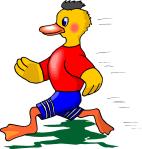Chatting in Español
Journeying as a Traveller rather than a tourist always presents it's own challenges as well as joys. Some are shared of course, such as laundering, whilst others are unique to the time when one steps outside the comfort zone and permits the sorrow of life to be confronted along with the museum images.
This morning as I sat at the breakfast table while Rob wandered through the hillsides of western Cantabria, I talked about the weather with the couple of fellow women at the table who were staying here longer term like us. As the bar’s owner Antonio called the elder, ill one for her massage, her daughter and I talked about the nature and cause of her condition. After a week and a half, I had thought that it was likely that she had something very much like MS, her difficulty in walking and movement, the paralysed state of one side of her face, and shaking movements were all too familiar to me. However, the true story was even sadder.
I had perhaps surmised that the two might have been mother and daughter, although this was far from necessarily obvious. Seven years ago in November (1994), a car accident had killed the woman's husband and two children. The resulting injury to her mother had meant months in a coma, and 3 years in hospital. The need to live for today, and enjoy life now was important to us all, and too rarely realised. Further details of insurance payments and so on were comprehended sufficiently, if not to the letter. Enough time was spent together over a shared table, bathroom and hallway to understand part of these people's life, and be let into something below the surface of the images of painted figures at a decaying Spa Resort of another era, taking the waters each morning and returning to eat carefully, rest and watch television. Tourists may speak the language more fluently in ordering their meals, and entering the guidebook venues of churches, galleries and museums. Yet in melding into the scenery enough to become an unobtrusive force in the landscape, you can do more than shares the joys of a children’s' birthday party in the tiny plaza next to the bar & general store on the roadway half a kilometre away. In ordering a cafe solo and Anis, I am more than complemented on my 'native' accent by the comments of the woman and instant recognition of my order, by our acceptance by the locals who sit outside on steps, or hold up the counter and discuss the sensationalist current affairs reports on TV.
This morning as I sat at the breakfast table while Rob wandered through the hillsides of western Cantabria, I talked about the weather with the couple of fellow women at the table who were staying here longer term like us. As the bar’s owner Antonio called the elder, ill one for her massage, her daughter and I talked about the nature and cause of her condition. After a week and a half, I had thought that it was likely that she had something very much like MS, her difficulty in walking and movement, the paralysed state of one side of her face, and shaking movements were all too familiar to me. However, the true story was even sadder.
I had perhaps surmised that the two might have been mother and daughter, although this was far from necessarily obvious. Seven years ago in November (1994), a car accident had killed the woman's husband and two children. The resulting injury to her mother had meant months in a coma, and 3 years in hospital. The need to live for today, and enjoy life now was important to us all, and too rarely realised. Further details of insurance payments and so on were comprehended sufficiently, if not to the letter. Enough time was spent together over a shared table, bathroom and hallway to understand part of these people's life, and be let into something below the surface of the images of painted figures at a decaying Spa Resort of another era, taking the waters each morning and returning to eat carefully, rest and watch television. Tourists may speak the language more fluently in ordering their meals, and entering the guidebook venues of churches, galleries and museums. Yet in melding into the scenery enough to become an unobtrusive force in the landscape, you can do more than shares the joys of a children’s' birthday party in the tiny plaza next to the bar & general store on the roadway half a kilometre away. In ordering a cafe solo and Anis, I am more than complemented on my 'native' accent by the comments of the woman and instant recognition of my order, by our acceptance by the locals who sit outside on steps, or hold up the counter and discuss the sensationalist current affairs reports on TV.

